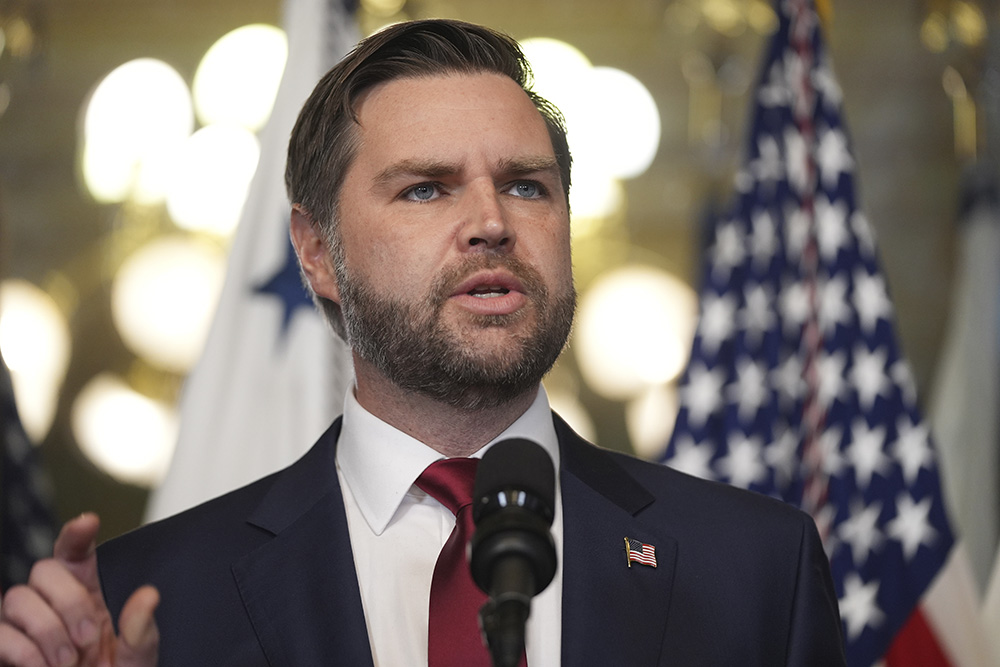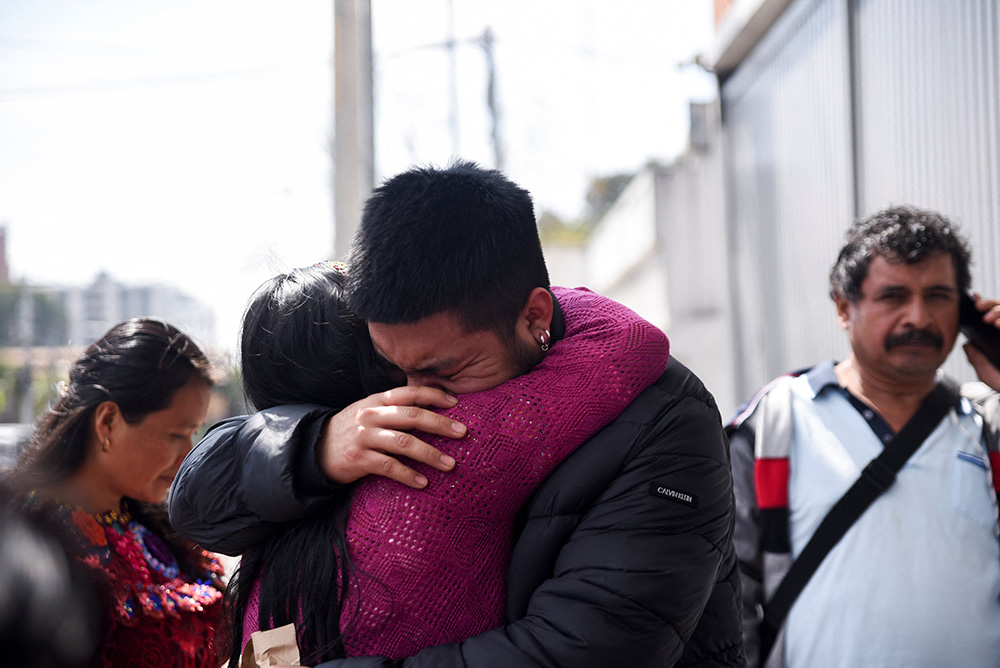
Vice President JD Vance speaks before swearing in Secretary of State Marco Rubio in the Vice Presidential Ceremonial Office in the Eisenhower Executive Office Building on the White House campus, Jan. 21, 2025, in Washington. (AP Photo/Evan Vucci)
The internet has been buzzing since Vice President JD Vance said during a Fox News interview on Jan. 29, "There is a Christian concept that you love your family and then you love your neighbor, and then you love your community, and then you love your fellow citizens, and then after that, prioritize the rest of the world. A lot of the far left has completely inverted that."
The online debate has been split on whether this sentiment is biblical or not. Many Christians have rushed to defend this hierarchy, citing 1 Timothy 5:8: "Anyone who does not provide for their relatives, and especially for their own household, has denied the faith and is worse than an unbeliever."
There's no doubt that Scripture speaks to our responsibility for family and community. But when it comes to something being "biblical," we have to be careful. Nearly anything can be found in Scripture if you're looking for it — stories of war, oppression, miracles and love, all written by people grappling with what it meant to be faithful. The Bible is not a rigid manual but a living testimony of human wrestlings with the divine.
Advertisement
This too is the context for 1 Timothy. The early church was learning what it meant to embody community in a world within an empire, defined by survival. Widows, among the most vulnerable, became a litmus test for whether the church's love could be more than abstract words. But there was tension — some families in Ephesus were neglecting their responsibility to care for their own, assuming the church would shoulder it all.
Paul reminds them: love starts close. It moves first toward those in front of us, ensuring widows were not abandoned while preserving the church's resources for those truly without support. But make no mistake — this isn't about love confined to bloodlines or geographic boundaries. It's about love rooted in responsibility, expanding outward. And it was subversive even then.
Others have pointed to Acts 1:8, where Jesus commands his followers to be his witnesses "in Jerusalem, and in all Judea and Samaria, and to the ends of the earth." Some have used this as a blueprint for a supposed hierarchy of love — that our obligation starts with family, but this wasn't a command for love in 21st century America; it was a geographical directive for a small group of followers in the ancient world. To them, "the ends of the earth" likely meant Rome, the seat of the empire.
The point wasn't about setting limits on love. It was about breaking them down — taking the gospel beyond familiar spaces and into contested ones. If anything, those of us in the United States are the ends of the earth, unimaginable to the earliest Christians. And yet, the gospel has already reached us. The real question is not whether love begins at home. It's what we do with it — how far we are willing to change ourselves and the world around us.
The real question is not whether love begins at home. It's what we do with it — how far we are willing to change ourselves and the world around us.
Vance's argument echoes a medieval concept known as ordo amoris — the order of charity, often attributed to St. Thomas Aquinas. The idea is that love must be ranked, that a person rightly prioritizes their affections, with family on top. In some ways, it sounds practical, even reasonable. Love is not meant to be an abstraction, floating in ideals without real world engagement.
But the problem with this hierarchy is that it feeds the myth that some people are more deserving of our care than others. It's a framework that makes sense in a world governed by scarcity and fear, where protection comes at the expense of others. But Jesus never speaks of love as something to be rationed. He speaks of love as abundance — a table where there is enough for everyone.
Colonial ideology has conditioned us to think in binaries and hierarchies — who is in and who is out, who is first and who is last. We struggle to fathom a love that is not ranked, that does not sort people into categories of worthiness. But Jesus seemed to be inviting us into a different world altogether — one where love moves freely and without hierarchy, breaking down the borders we've been taught to build.
When Jesus was asked, "Who is my neighbor?" he responded with a story: a man is beaten and left for dead. The religious leaders pass by, their robes untouched by the mess of it all. The Samaritan — a stranger, a foreigner, an enemy — stops. He is the one who shows love.

A migrant is greeted by a family member outside the Returned Migrant Reception Center in Guatemala City, Guatemala, Jan. 27, 2025, after he and other Guatemalan migrants arrived at La Aurora Air Force Base on a deportation flight from the U.S. (OSV News/Reuters/Cristina Chiquin)
Jesus' point was not about prioritizing family first and neighbors second. It was about demolishing the categories that keep us from seeing each other as worthy of love in the first place. Love of family and love of neighbor are not in competition; they are part of the same holy calling. Jesus goes even further:
"Love your enemies and pray for those who persecute you. … If you love those who love you, what reward will you get? Are not even the tax collectors doing that? And if you greet only your own people, what are you doing more than others? Do not even pagans do that?" (Mt 5:44, 46-47)
When Jesus speaks of family, it's not defined by blood or borders but by kinship in God. When someone tells him his mother and brothers are waiting to speak with him, Jesus points to his disciples: "Here are my mother and my brothers. For whoever does the will of my Father in heaven is my brother and sister and mother" (Mt 12:48-50).
Jesus redefines family, not as a fortress to be guarded but as an ever-widening circle. And the call to love is no different.
When Jesus speaks of family, it's not defined by blood or borders but by kinship in God.
No, I won't deny the complexities of immigration. But framing love as something calculated and conditional misses the heart of it entirely. Of course, we do not neglect our families. Of course, we invest in our local communities. In fact, this is how we enact the deepest change — by voting, by fighting, by pushing back against systems in place that refuse to protect the most vulnerable among us.
But love cannot stop there. The love Jesus speaks of is not about calculation or a choice between our families or neighbors. It is not a finite resource to ration out, but a river that flows, wild and without restraint. The empire's vision of love is built on scarcity, but the kingdom of God is built on abundance.
If we find ourselves asking, "Who is my neighbor?" — we are already missing the point. The better question is: How do I love without limits?








